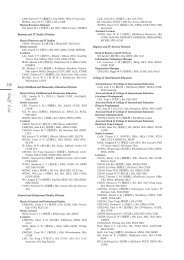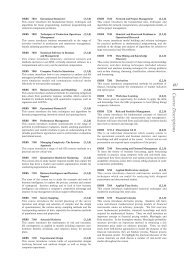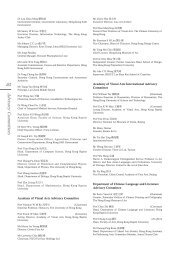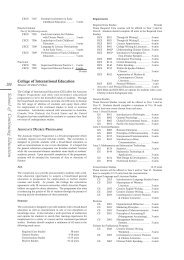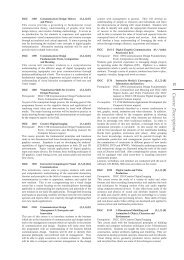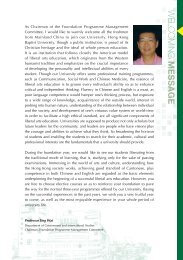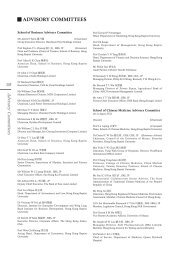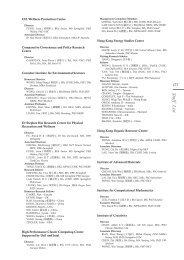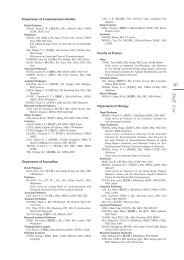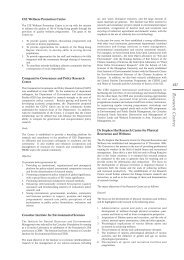364<strong>Course</strong> <strong>Descriptions</strong>While this is a self-contained course with assessable intendedlearning outcomes, it is also hoped that students will emerge fromthe course with a renewed sense of the importance of sociallyresponsible marketing, and carry this sense with them into theirpersonal lives as consumers and/or corporate employees.GDBU 1075 Marketing Yourself (3,3,0) (E)Marketing does not just apply to conventional products andservices. Marketing applies to any context where competitionexists. Life is competitive. Individuals compete with each other,be it in finding a life time partner or seeking career advancement.In this sense, people require knowledge and skills for how tomarket themselves effectively.The aim of this course is to introduce students to the concepts ofpersonal marketing, from self-analysis and goal setting through tomarket analysis, strategy development, strategy implementation,and evaluation. Grounded in fundamental marketing conceptsand models, students will learn how to formulate their personalambitions, vision, and mission; perform a personal SWOT(strengths, weaknesses, opportunities, threats) analysis; establishpersonal success factors, objectives and personal improvementactions; identify and analyse a target market; and implement andcontrol their personal marketing plan so as to satisfy the targetmarket and in doing so achieve their personal objectives.Although this is a self-contained course with assessable intendedlearning outcomes, it is primarily intended that a more enduringoutcome will be achieved, i.e. students will emerge from thecourse with a renewed sense of the importance of personalmarketing, and carry this sense with them into their lives so as tofacilitate their personal and professional success. Students mayalso use the knowledge and skills gained to assist significant othersaround them who may also benefit from personal marketing. Thisis an inspiring and innovative subject that is ideally matched to alltertiary students since they are at a lifecycle stage where personalmarketing skills may determine their ultimate success or failure.By emphasizing whole person analysis and development, thecourse also concurs with the university’s whole person ethos.GDBU 1076 International Business Etiquette (3,3,0)Business etiquette skills are an essential requirement in today’sglobal business environment. Graduates from all disciplines arelikely to find themselves working in a business of one form oranother, and more open than not that business will be involvedin activities outside of its home country. Even if they are notinvolved in a business, graduates are likely to find themselvesmingling with cultures other than their own.In today’s increasingly diverse and ever-changing global workingenvironment, the old rules of conduct often do not apply.Customs vary, and language and cultural differences are amongthe many factors making interaction an increasingly complexchallenge. As global business continues to expand and bringpeople closer, the most important element of successful businessoutcomes may be the appreciation and respect for regional,country and cultural differences. The rules of proper etiquetteand protocol have been around for years, but they are far moreimportant now-a-days.Business etiquette is a set of rules and guidelines that makean individual’s professional relationships more harmonious,productive, manageable and meaningful. While students areoften taught about functional aspects of business, they are seldomtaught about business etiquette. Employing proper etiquette inany business or social environment communicates an attitude ofrespect, equality and trust toward them. Knowledge of businessetiquette and manners enhances personal effectiveness. The aimof this course is to highlight global business etiquette dos anddon’ts involving dress, body language and gestures, dining, giftgiving,meetings, customs, negotiation, greetings, conversations,and entertaining. By the end of the course students will have anincreased cultural sensitivity and appreciation of how applying thecorrect etiquette can enhance business outcomes.GDBU 1077 Social Entrepreneurship: (3,3,0)Opportunities to Change the WorldThis course is about encouraging the entrepreneurial intentionand venture creation of students to address social issues, createeffective responses to social needs and innovative solutions tosocial problems, suggest ways to change the community andsociety, and provide impacts to the global community.The aims of this course are: (1) to introduce students to theconcepts, practices, and challenges of social entrepreneurship in<strong>Hong</strong> <strong>Kong</strong>, Greater China and around the world; (2) to equipstudents with frameworks and tools that offer insights into howsocial value is created and how social impact can be measured,and (3) to engage students in a joint learning process with socialentrepreneurs in <strong>Hong</strong> <strong>Kong</strong> so as to enable students to acquirea strong grasp of the various forms, models and approaches thatsocial entrepreneurs are using to attain the “triple bottom line”,that is having the greatest financial, social and environmentalimpact.GDBU 1085 Understanding Chinese Consumers (3,3,0) (E)China’s economic reform has made it one of the most promisingconsumer markets in the world. With growing purchasing power,Chinese consumers seek more and better products to improvetheir lives, creating huge opportunities for international marketers.However, traditional understanding of consumer behaviour isbased on Western conceptualizations which make it difficultfor international marketers to understand the psychology andbehaviour of Chinese consumers. In turn, the effectiveness oftheir marketing strategies is also limited.This course aims at providing non-business students with a selfcontainedand fundamental understanding of Chinese consumers.Specifically, it discusses how cultural values, the historicalbackground, legal regulations, and socioeconomic trends affectChinese consumers’ perception, attitude, and behaviour towardsvarious marketing stimuli. Based on this understanding, thecourse will discuss how marketers can formulate effectiveand socially responsible marketing strategies to serve Chineseconsumers.GDBU 1086 Understanding the World of (3,3,0)BusinessEveryone is involved in a business, either as an employee, aconsumer, and/or an owner. It is in everyone’s benefit, therefore,to understand how a business operates. The aim of this course isto introduce students to the central features of a modern business.The course provides students with an overview of the businesstrends both domestically and internationally, the principlesimportant to starting a new business, and different forms ofbusiness ownership. Students will be exposed to a multitude ofbusiness disciplines such as management, marketing, financeand accounting, and appreciate how they come together to forman integrated organization. In addition, various institutions thatoperate in the business environment such as government andfinancial institutions are studied.As we move into the twenty-first century, clear trends areemerging in the business world. For instance, the business worldis becoming more global, social responsibility and ethical practicesare being emphasized more, and demographic and lifestyleshifts are changing the way we shop, where we work and howwe live. Graduates, regardless of discipline, need to understandthe business environment, the changes that are occurring in it,and how to succeed in it. This course enlightens students byusing principles, guidelines and application exercises to illustratethe way in which business impacts our daily lives as employees,consumers, and owners.GDBU 1846 Leadership in Sustainability (3,3,0) (E)The course, Leadership in Sustainability, is proposed to helpdevelop responsible business graduates who can decipher theimportance of leadership practiced by sustainability leadersin the corporate world. The aspects of good practice includeenvironmental protection, good governance, quality and safeproduct and service offerings, motivational human resources
management and proactive stakeholder engagement.This new course extends far beyond the classroom. It includesseveral teaching and learning methods including case studies,mentoring by corporate leaders, field studies, innovative problemsolving, experiential learning and descriptive case writing.The objective is to maximize students’ exposure to real leadershipcases in driving sustainability. In the process, students willgenerate intrinsic motivation to delve into the understanding ofrelated issues, develop the right values for ethical and responsiblemanagement and be prepared to become change agents.Corporate partnership will be sought so that students can learnabout sustainability practice through first hand visits and datagathering for putting together descriptive cases of sustainablepractice.GDBU 1847 Everyday Physics for Future (3,2,1)ExecutivesIn this course, a descriptive approach will introduce non-sciencestudents to concepts of physics that considerably overlap otherdisciplines and impact societal issues; the concepts and analyseswill enable them to develop well-informed opinions and decisionsin business, in public policy-making, in communications, invisual arts, in daily life, etc. Thereby leadership capabilities willbe instilled in our students. This course is adapted from a famousGE course given at the <strong>University</strong> of California, “Physics andTechnology for Future Presidents”. It will use HKBU’s iQlickersto immediately gauge the students’ understanding, as well as PeerInstruction developed at Harvard by physicist Prof. Eric Mazur.GDBU 1855 Celebrity and Entertainment (3,2,1)BusinessMore than just as a spokesperson of a product/brand, celebritiesand figures of fame play an important role in the creative sectorto date. This course maps the increasingly central importance offame and celebrity from a mass communication and marketingperspective. In this course, students will investigate the culture ofcelebrity in relation to entertainment, media, advocacy, identityand business models. It aims to introduce the phenomenonof stardom including some case studies of individual film,television, advertising, popular music and political stars, and toinvestigate the media influence of celebrities in a Chinese culturalcontext. This is fundamentally a preliminary course designedto help students think more critically about the intersection ofentertainment and civic engagement in the new media era. Italso aims to strengthen student’s understanding of the culture ofcelebrity on the societal values and choices in a Chinese culture.GDBU 1856 How Ideas Spread (3,3,0)This course explores cultural propagation of ideas from aninterdisciplinary perspective that includes communicationstudies, anthropology, psychology, sociology, and marketing. Itcomprehensively, yet succinctly, takes you through what getspropagated (nature of popularly propagated ideas), who areinvolved in propagating (opinion leaders, early adopters, etc.),when cultural propagation arises (circumstances leading to thegeneration and spread of ideas), where ideas are spread (socialnetworks, online communities, etc.), why individuals propagateideas (motives, goals, and desires), and how ideas are propagated(modes of transmission).GDBU 1867 Children as Consumers: Marketing (3,2,1)to the YouthChildren and youth are future of the society. Due to theprolonged period of education, the position of youth hadbecome increasingly ambiguous. The course aims at introducingthe different perspectives and often competing interest amongmarketers, parents, educators, and policy makers regardingcommunication to children and youth. The course will begin withthe changing concepts of childhood and the position of childrenand youth in a social context. It continues with the cognitive andaffective responses toward commercial communication, as wellas development of the understanding of brands among childrenand youth consumers. Parental and peer influence and the roleof marketers and legislators will be explored. Ethical issuesconsidered by media executives, marketers, parents, citizens, andthe government regarding children as consumers will be discussed.The course will conclude by examining concems related withundesirable consequences of advertising to children and youthconsumers, such as unhealthy eating, gender stereotyping, andmaterialism.GDCV 1005 Film, History, and Social Change (3,3,0) (E)This course will explore the way in which film has representedhistory and social change, and also seeks to inform studentsabout the nature and character of particular historical events, andperiods of social change. The course will also explore film as film:as a constructed, aesthetic and expressive artifact; and pertinentaspects of film theory will also be considered in relation to this.Emphasis will be on both the historical and social meaning andsubstance of the events portrayed in the film, and the way inwhich film portrays those events.GDCV 1006 Film and Controversy (3,3,0)This course will explore critical issues surrounding films. It willexamine a number of controversial topics regarding History,Politics, Society, Culture and Religion, and will focus on howfilms can both represent and fuel controversies. By explainingand articulating the specific context in which a controversy hasoccurred, students will learn to apply critical judgments andresponsible decisions in their own lives, eventually growingtowards better intercultural understanding and respect, as well asknowledge about cinematic tools, which are crucial to a criticalanalysis of moving images and sounds.GDCV 1007 <strong>Hong</strong> <strong>Kong</strong> Cinema and (3,3,0) (C)<strong>Hong</strong> <strong>Kong</strong> CultureThrough watching and discussions of <strong>Hong</strong> <strong>Kong</strong> films selectedby virtue of their relevance to three general aspects of <strong>Hong</strong><strong>Kong</strong> culture (identity, cityscape, social structure), the culturaldialectics of <strong>Hong</strong> <strong>Kong</strong> will be explored. The emphases will bethe interplays of form and content, and the mutual influence offilm as a medium of expression and film as a cultural product.Students will see how <strong>Hong</strong> <strong>Kong</strong> Cinema reflects <strong>Hong</strong> <strong>Kong</strong>culture and how local culture and production environments atdifferent times affect the messages, forms, and movements of<strong>Hong</strong> <strong>Kong</strong> Cinema. Comparisons to films from the West andother Asian countries may be drawn to position <strong>Hong</strong> <strong>Kong</strong> in theWorld.GDCV 1015 Television and Popular Culture (3,3,0)The course will introduce students to the concept of popularculture, the relationship between television and popular culture,and the role which television has played in shaping popularculture. The historical development of television and popularculture will be explored. The course will consist of lectures on thesubject, followed by screenings of selected television programmesor extracts from such programmes, and then by programmeanalysis. The programmes will be analysed in terms of theirnarrative, visual style and deployment of popular cultural forms.GDCV 1016 Advertising and Society (3,2,1) (E)This course will investigate the various social impacts ofadvertising in <strong>Hong</strong> <strong>Kong</strong>. Issues including advertising andmaterialism, commercialization of childhood, stereotypes andgender identity, advertising and environment as well as advertisingand food choice will be discussed. The social and economicenvironment where advertising messages are interpreted willbe analysed. The regulation of advertising and public attitudestoward advertising will be elaborated.GDCV 1017 Communication in Interpersonal (3,2,1) (E)EncountersThis course introduces students to the major topics and principlesin interpersonal communication. Students will learn the essential365<strong>Course</strong> <strong>Descriptions</strong>
- Page 3 and 4:
economic growth, trade, pollution,
- Page 5 and 6:
specific empirical economic problem
- Page 7 and 8:
of private enterprises in the indus
- Page 9 and 10:
period. The first part of the cours
- Page 11 and 12:
The reactions and effectiveness of
- Page 14: 314Course DescriptionsEDUC 3080 Tea
- Page 17 and 18: development of children and adolesc
- Page 19 and 20: and communication skills in differe
- Page 21 and 22: y ubiquitous technology. Learners w
- Page 23 and 24: ENG 2650 Topics in English Grammar
- Page 25 and 26: clause structures of the English la
- Page 27 and 28: adopted for reading and interpretin
- Page 29 and 30: drama; and (2) introduce Western dr
- Page 31 and 32: ENGL 4005 Advanced Topic in Compara
- Page 33 and 34: attendant to the break-up of mediev
- Page 35 and 36: EURO 3205 Comparative Politics of (
- Page 37 and 38: states, enlargement provides signif
- Page 39 and 40: to create and develop ideas via rel
- Page 41 and 42: strategies of awarded campaigns to
- Page 43 and 44: characteristics of films, film-make
- Page 46: 346Course DescriptionsFINE 1005 Fin
- Page 49 and 50: GCHC 1005 China and the Global Econ
- Page 51 and 52: the period with a special focus on
- Page 53 and 54: est decision-making procedures. Mor
- Page 55 and 56: GCPE 1065 Table Tennis (1,2,0) (C)T
- Page 57 and 58: and/or philosophical traditions the
- Page 59 and 60: on the use of English in various se
- Page 61 and 62: GDAR 1835 Music, Mind, and Human (3
- Page 63: lead to successful development of n
- Page 67 and 68: GDCV 1065 Buildings of Hong Kong: (
- Page 69 and 70: of various religions that broaden t
- Page 71 and 72: their implications for contemporary
- Page 73 and 74: gone through since 1945 included th
- Page 75 and 76: GEOG 1005 Geography and the Contemp
- Page 77 and 78: students to the concepts and techni
- Page 79 and 80: GEOG 3730 Energy Policy and Analysi
- Page 81 and 82: processes interact with China’s s
- Page 83 and 84: GERM 1006 German II (3,3,0) (G)Prer



